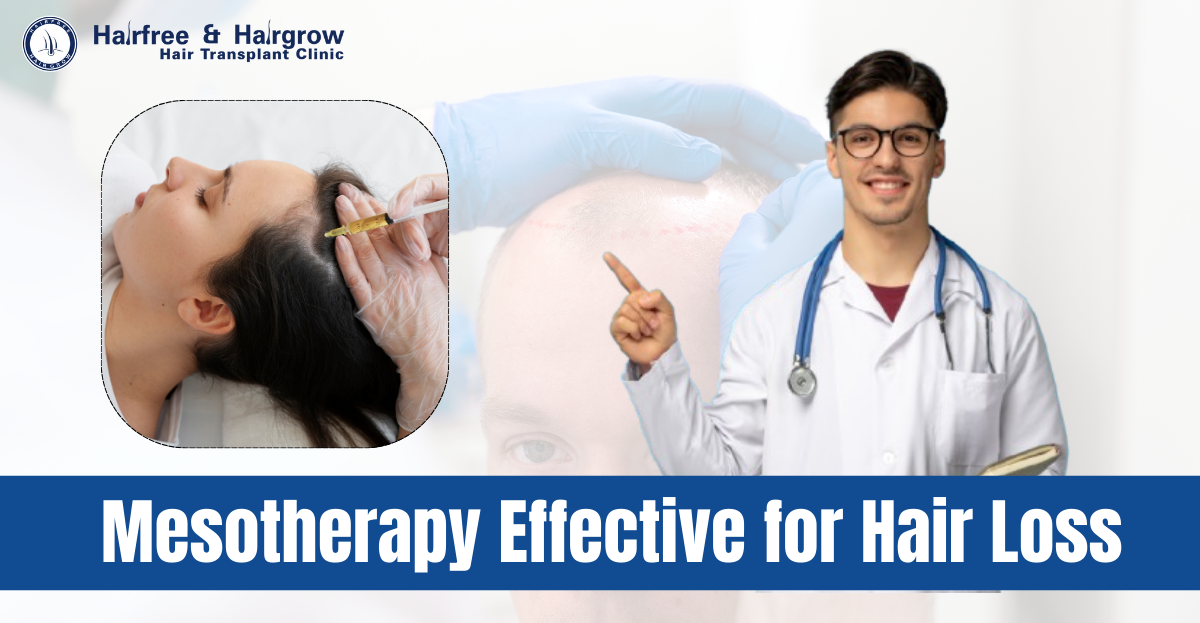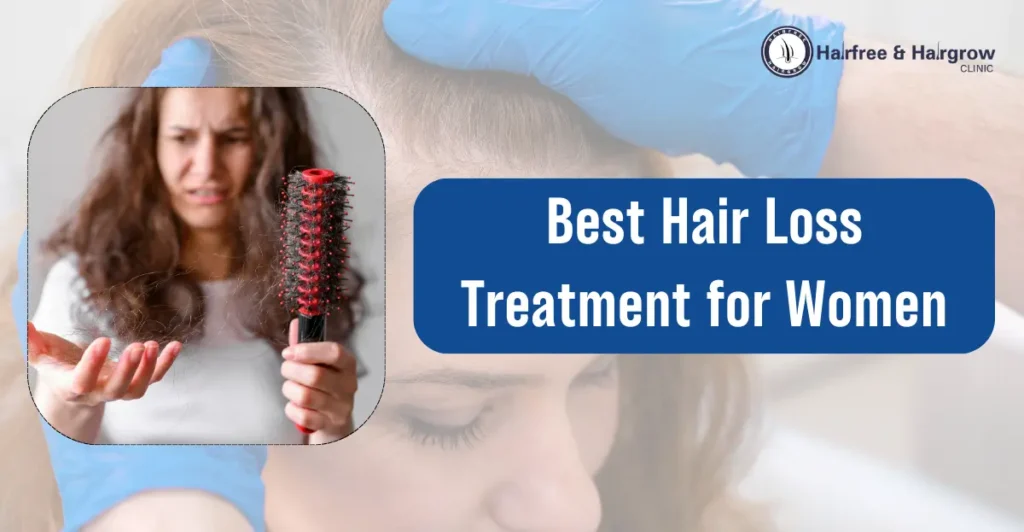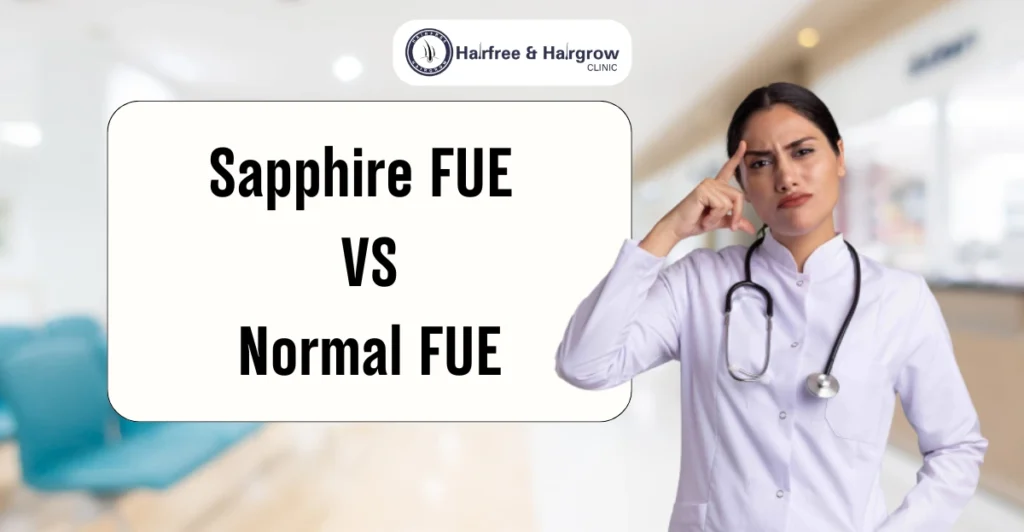Hair loss can be a distressing issue for many, leading people to seek out a variety of treatments. Among these, mesotherapy has emerged as a non-surgical hair restoration option for those experiencing hair thinning or loss. This article will highlight the efficiency of mesotherapy for hair loss, how it works, and if it would suit you.
Table of Contents
Brief Overview and History of Mesotherapy
Mesotherapy is a medical procedure that involves injecting a mixture of vitamins, minerals, amino acids, and medications directly into the mesoderm, the middle layer of the skin. It was first developed in France by Dr. Michel Pistor in 1952 and was initially used to relieve pain. Over time, it has evolved into a popular cosmetic treatment for various conditions, including skin rejuvenation, fat reduction, and hair loss.
Our Clinic Location: Hair Transplant in Dhaka
How Does Mesotherapy Work for Hair Loss?
It is through the injection of a custom-made solution into the scalp that mesotherapy treats hair loss. The idea is to deliver nutrients and medications directly into the follicles. It is crucial to restoring hormone balance to improve blood circulation and thicker hair growth.
The Procedure
- The injection Procedure
During hair loss mesotherapy treatment, a fine needle or mechanical injector is used to apply the mixture onto the scalp. The number of injections as well as depth would vary according to a given patient’s unique case of balding. Treatment sessions often last from 20-30 minutes.
- Types of Solutions Used
The combination of scalp mesotherapy solutions often contains:
o Vitamins (B-complex, biotin)
o Minerals (zinc, magnesium)
o Amino acids (arginine, cysteine)
o Enzymes
o Growth factors
o Minoxidil or finasteride Sometimes based on the patient’s condition
The selection and formulation of these components are customized for every client suffering from different diseases.
Mechanism of Action
Mesotherapy treats hair loss by tampering with mechanisms that can address hair loss as follows:
- Nutrient delivery
The injections provide essential nutrients directly to the hair follicles. This stimulates cell metabolism and ultimately promotes the growth of healthier hair.
- Hormonal regulation
Androgenic alopecia (male or female pattern balding) is one situation where hormonal imbalances can be dealt with using DHT blockers in mesotherapy hair regrowth solutions.

Is Mesotherapy Effective for Hair Loss?
The effectiveness of mesotherapy for hair loss varies depending on the underlying cause of the hair loss and how each person responds to treatment. In general, mesotherapy is more effective for some types of hair loss than others.
Effectiveness in Different Types of Hair Loss
- Androgenetic Alopecia
This is by far the most typical type of hair loss often called male or female pattern baldness. Mesotherapy can slow down its progression through nutrient supply improvement as well as DHT reduction in the scalp.
- Telogen Effluvium
This is a temporary form of hair loss often triggered by things like stress, illness, or changes in hormones. Mesotherapy can be effective for stimulating hair regrowth by boosting the health of the follicles and restoring hair density.
- Alopecia Areata
Alopecia areata is an autoimmune disorder causing circle patches within which there will be no hair at all. Even though scalp mesotherapy cannot treat underlying autoimmune causes directly, it may facilitate global scalp improvement and repair in less serious instances.
Clinical Evidence
Although some clinical studies, as well as anecdotal evidence, lend support to the use of mesotherapy for hair loss, there is still a lack of large, randomized controlled trials. After several sessions of mesotherapy, some patients report significant improvement in density and reduction of hair loss while others experience only minor mesotherapy benefits.
Comparison of Mesotherapy with Other Hair Treatment Approaches
The mesotherapy results in hair thinning when compared to other hair restoration alternatives it is a less invasive option. Topical preparations such as minoxidil and oral finasteride are simpler but they may not be able to deliver aimed nutrients just like mesotherapy does.
Advantages of Mesotherapy for Hair Loss
- Non-invasive: In contrast to surgical hair restoration methods, mesotherapy does not involve cuts and allows patients to resume regular activities nearly immediately after treatment.
- Slight adverse reactions: If they happen at all, side effects are usually minor and may consist of transitory blushness, swelling, or discomfort in the area where the drug was administered.
- Localized therapy: By providing the hair root with different nutrients, mesotherapy helps improve scalp condition and stimulates new hair growth.
- Personalizable: Depending on what contributes most to an individual’s baldness (for example lack of vitamins or hormonal disorders), the mixture can be prepared differently for each person.
Limitations and Risks of Mesotherapy
- Varied outcomes: Mesotherapy doesn’t work the same for everyone thus its efficacy may differ.
- Need multiple sessions: When significant changes are expected, it needs a series of sessions which increases total cost.
- Lack of substantial clinical findings: More studies must be conducted to ascertain conclusively the long-term impact of mesotherapy on hair loss.
How to Know if Mesotherapy is Right for You?
A dermatologist or hair specialist should be consulted if you think of trying mesotherapy for baldness to see if it applies to your particular situation. They ought to know what brought about your alopecia and then propose the best strategy that could involve mesotherapy plus other alternatives.
Our Patient's Hair Regrowth Journey with Mesotherapy
A few years ago, I noticed my hair was thinning, and it hit my confidence hard. I tried to ignore it, hoping it would get better on its own, but it got worse. In search of a solution, I turned to natural remedies like onion juice, which I had heard could work wonders for hair growth. I applied it for many weeks, along with trying other home remedies like coconut oil and aloe vera. Unfortunately, none of these worked for me. My hair continued to thin, and I felt more and more frustrated with each passing day.
After talking to a hair specialist doctor, I decided to give mesotherapy a try. This treatment uses small injections of vitamins and nutrients directly into the scalp to promote hair growth. I was nervous at first, but the process was quick and slightly uncomfortable. After a few sessions, I started noticing a difference; my hair was growing thicker and stronger again, and hair fall had reduced.
Conclusion
One of the most promising and non-surgical methods for addressing hair loss is mesotherapy which is especially beneficial for individuals experiencing nutrient deficiency or hormonal imbalance. Although there may be a variation in results, several patients have reported positive outcomes with this treatment. Consulting an expert will help you make the decision that best suits your needs when it comes to hair restoration using mesotherapy.
FAQ
Depending on the degree of baldness, at least 8-12 sessions would be required within a week or two intervals.
It might be possible to notice some changes within the first two to three sessions; however, greater improvements often take several months.
Usually, there are mild negative effects such as slight pain or tenderness at the site where it was injected including redness and swelling.
Yes, combining mesotherapy with treatments like PRP, minoxidil or finasteride produces better results.
Although it helps in reducing baldness and enhancing the regrowth of hair strands through ongoing maintenance procedures, mesotherapy is not a panacea for a lack of bloom bata.

Written By
Dr. Nazmin Nipa
Medical Officer & Hair Transplant Surgeon
Dr. Nazmin Sultana Nipa is a distinguished hair transplant doctor in Bangladesh, known for her advanced skills in hair restoration. As a Medical Officer and Hair Transplant Surgeon, Dr. Nipa combines her extensive experience in the field with a focus on transparency and patient-centered care.
Disclaimer
We’ve made all possible efforts to ensure that the information provided here is accurate, up-to-date and complete, however, it should not be treated as a substitute for professional medical advice, diagnosis or treatment. See Detailed Disclaimers Here.



